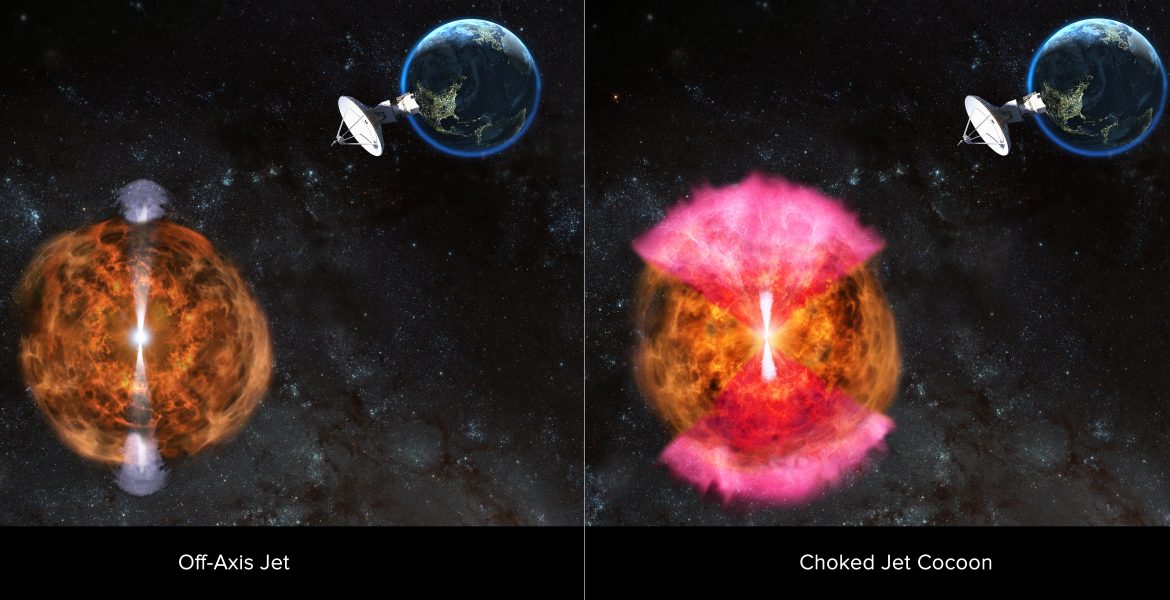搜索结果: 1-14 共查到“天体物理学其他学科 Observations”相关记录14条 . 查询时间(0.251 秒)

Radio Observations Point to Likely Explanation for Neutron-Star Merger Phenomena(图)
Radio Observations Point Likely Explanation Neutron-Star Merger
font style='font-size:12px;'>
2018/1/10
Three months of observations with the National Science Foundation’s Karl G. Jansky Very Large Array (VLA) have allowed astronomers to zero in on the most likely explanation for what happened in the af...

First Observations Of Merging Neutron Stars Mark A New Era In Astronomy(图)
First Observations Merging Neutron Stars Mark New Era Astronomy
font style='font-size:12px;'>
2017/10/26
Two months ago, the Advanced Laser Interferometer Gravitational-Wave Observatory (LIGO) notified astronomers around the world of the possible detection of gravitational waves from the merger of two ne...

You can see that from here:New telescope attachment allows ground-based observations of new worlds to rival those from space(图)
New telescope attachment ground-based observations new worlds space
font style='font-size:12px;'>
2017/10/25
A new, low-cost attachment to telescopes allows previously unachievable precision in ground-based observations of exoplanets -- planets beyond our solar system. With the new attachment, ground-based t...
TESELA: a new Virtual Observatory tool to determine blank fields for astronomical observations
Observatory determine blank fields astronomical observations
font style='font-size:12px;'>
2011/10/12
The observation of blank fields, regions of the sky devoid of stars down to a given threshold magnitude, constitutes one of the typical important calibration procedures required for the proper reducti...
Chandra High Energy Grating Observations of the Fe Ka Line Core in Type 2 Seyfert Galaxies: A Comparison with Type 1 Nuclei
Grating Observations Seyfert Galaxies Comparison
font style='font-size:12px;'>
2011/9/26
We present a study of the core of the Fe Ka emission line at ~6.4 keV in a sample of type II Seyfert galaxies observed by the Chandra High Energy Grating (HEG). The sample consists of 29 observations ...
Multiwavelength Observations of Accretion in Low-Mass X-ray Binary Systems
Multiwavelength Observations Accretion Low-Mass X-ray Binary Systems
font style='font-size:12px;'>
2011/1/11
This work is intended to provide an introduction to multiwavelength observations of low-mass X-ray binaries and the techniques used to analyze and interpret their data. The focus will primarily be on ...
Studying Frequency Relations of kHz QPOs for 4U 1636-53 and Sco X-1: Observations Confront Theories
Studying Frequency Relations kHz QPOs 4U 1636-53
font style='font-size:12px;'>
2011/1/13
By fitting the frequencies of simultaneous lower and upper kilohertz Quasi-Periodic Oscillations (kHz QPOs) in two prototype neutron star QPO sources (4U~1636-536 and Sco X-1), we test the predictive...
Radio Observations of HD 80606 Near Planetary Periastron
Radio Observations HD 80606 Near Planetary Periastron
font style='font-size:12px;'>
2011/1/11
This paper reports Very Large Array observations at 325 and 1425 MHz (90cm and 20cm) during and near the periastron passage of HD 80606b on 2007 November 20. We obtain flux density limits (3-sigma) of...
A shock front in the merging galaxy cluster Abell 754: X-ray and radio observations
the merging galaxy cluster Abell 754 X-ray radio observations
font style='font-size:12px;'>
2011/1/11
We present new Chandra X-ray and Giant Meterwave Radio Telescope (GMRT) radio observations of the nearby merging galaxy cluster Abell 754. Our X-ray data confirm the presence of a shock front by obtai...
SS 443: multicolour observations 1982-1990
multicolour
font style='font-size:12px;'>
2010/11/10
We report BVR photometry of the V1343 Aql= SS 433 microquasar at different phases of the 13–day orbital cycle for the 1986–1990 observing seasons. The data include five complete cycles of the 163d pre...
The Doppler Shadow of WASP-3b: A tomographic analysis of Rossiter-McLaughlin observations
Earth and Planetary Astrophysics (astro-ph.EP)
font style='font-size:12px;'>
2011/1/6
Hot-Jupiter planets must form at large separations from their host stars where the temperatures are cool enough for their cores to condense. They then migrate inwards to their current observed orbital...
An uncombed inversion of multi-wavelength observations reproducing the Net Circular Polarization in a sunspots' penumbra
Solar and Stellar Astrophysics (astro-ph.SR)
font style='font-size:12px;'>
2010/12/28
I derived a geometrical model of the penumbral magnetic field topology from an uncombed inversion setup that aimed at reproducing the NCP of simultaneous spectra in near-IR (1.56 mu) and VIS (630 nm) ...
Observations of dusty torii and compact disks around evolved stars: the high spatial resolution IR view
Solar and Stellar Astrophysics (astro-ph.SR)
font style='font-size:12px;'>
2010/12/24
The recent high angular resolution observations have shown that the transition between a globally symmetrical giant and a source surrounded by a spatially complex environment occurs relatively early, ...
Evidence for a current sheet forming in the wake of a Coronal Mass Ejection from multi-viewpoint coronagraph observations
Solar and Stellar Astrophysics (astro-ph.SR)
font style='font-size:12px;'>
2010/12/23
Ray-like features observed by coronagraphs in the wake of Coronal Mass Ejections (CMEs) are sometimes interpreted as the white light counterparts of current sheets (CSs) produced by the eruption.

